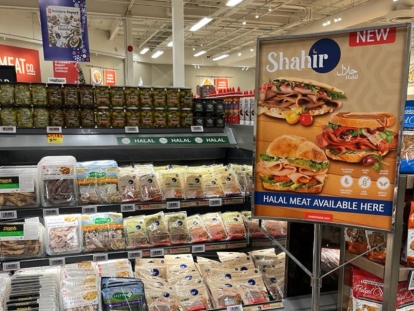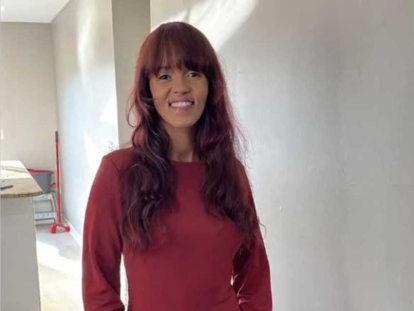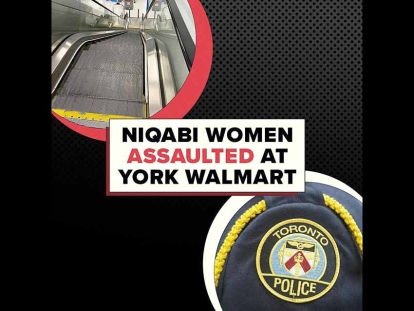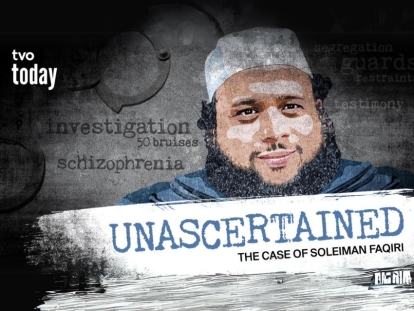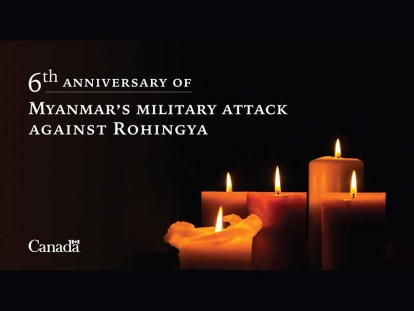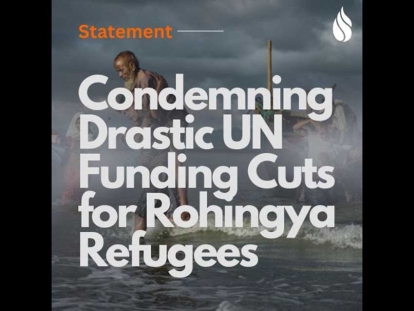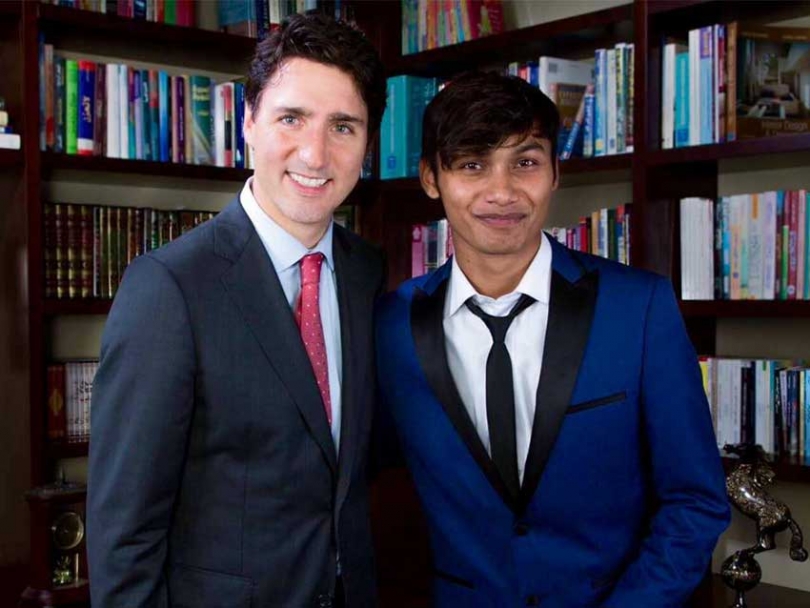 Rohingya refugee Ahmed Hashim Ullah meeting Prime Minister Justin Trudeau.
Courtesy of Ahmed Hashim Ullah
Rohingya refugee Ahmed Hashim Ullah meeting Prime Minister Justin Trudeau.
Courtesy of Ahmed Hashim Ullah
May
Ahmed Hashim Ullah: Being a Rohingya Refugee in Bangladesh and Canada
Written by Chelby DaigleAhmed Hashim Ullah is a Rohingya refugee living in Kitchener-Waterloo. He and a number of other Rohingya refugee youth worked with Yusuf Zine to develop the play I Am Rohingya. They are successfully crowdfunded to raise enough funds to develop the story behind the making of the play into a documentary.
Muslim Link had an opportunity to interview Ahmed about his journey as a Rohingya refugee from Bangladesh to Canada. This is a harrowing story of violence, despair, and multiple failures of systems in Bangladesh and Canada that should protect and support vulnerable refugees.
Although grateful for the safety he has found here, Ahmed is also critical of Canadian social services’ failure to properly support refugees with mental health issues and the placing of refugee children in foster care.
Ultimately, the story of Ahmed and his family is a story of resilience and one family’s struggle to stay together against all odds.
How do you feel about the fact that many people even know that there are Rohingya living in Canada
Yes so many people don’t even know the name Rohingya. I don’t blame them if the Canadian government doesn’t talk about it enough. I can’t blame someone else for not knowing who my people are. I can’t put that burden on someone else.
People are only talking about the Rohingya refugee crisis now, but there has been a problem even before recent events.
Yes, since 1982 and even before then. In ’82 is when Rohingya started fleeing the country, a lot of people were moving out. A law was passed that denied the Rohingya Burmese citizenship. You didn’t hear about it a lot like now because back then there wasn’t social media and no one had phones to cover it.
Today, because of social media, the story of the Rohingya is getting out there. Individuals in the Canadian community and lots of other communities around the world are trying to help us, but their governments are not doing anything.
What is your understanding of the conflict in Burma?
Burmese Buddhists are the dominant group but in the state of Rakine in Burma, Rohingya are one of the largest ethnic groups. That is where a lot of the violence is happening. I know Rohingya refugees who saw their mothers and sisters raped, their fathers killed in front of them. People in Canada think that everyone who is Buddhist is peaceful and can never be violent but that’s not true. People in Burma are using the religion of Buddhism to justify violence against Muslims. But not every Buddhist is bad. I’m not going to put that on every single one of them, because people say if there’s a Muslim person who’s a terrorist it doesn’t mean every Muslim is a terrorist, right? I’m going to say 90% of the Buddhist people in Burma want to help the Rohingya but they can’t because in the process they will be killed as well.
Aung San Suu Kyi gave my people so much hope in the beginning when she was elected. But you know, politicians they promise you a lot before they get elected, but then they get elected and you see who they really are. She told my people that she would save us, that she would help us get our citizenship. But after she got elected, she has made laws trying to erase us and say that we don’t belong in Burma.
How did your family end up fleeing to Bangladesh?
They were forced to leave the country. I still have family in Burma but my family started to leave in 1982. My father’s part of the family was very wealthy but my mother’s family weren’t that rich. One of my aunts, my mother’s oldest sister, got killed by the Burmese. My mom’s family, some of them left and some of them stayed because they didn’t want to move to a different country and become poor.
My father was really in love with my mom and moved to Bangladesh for that reason. My grandmother was sick and she didn’t come to Bangladesh because she said she wanted to die where she was born. My grandfather went back to her. She died of a heart attack, and he got killed by a Buddhist so I never met my grandparents.
My parents slowly moved into the United Nations (UN) refugee camp in Bangladesh. At first they lived just outside of it, but nothing was provided by the UN if you were not living in the camp. My mother was married when she was 12 years old. My mother had me in 1993 when she was only 13 years and 13 days old! But in 1994 the Bangladeshi government did not want us living there anymore. They attacked us and we refused to go. That’s when the UN started working more to help us.
A man who wanted to marry my mother made a fake statement about my dad and then forced my mother into a marriage. This man was actually like the mayor of the refugee camp, the UN gave this man all the power in the camp so he was able to get my father arrested and force my mother to marry him. My dad committed suicide while he was in jail.
People often assume that when things are controlled by the UN that everything is safe but it’s not true.
No, it’s not true and when I think about what happened to my dad I don’t blame the Bangladeshi government or the Buddhists in Burma, I blame the UN for putting the wrong people in power in our refugee camp.
Before my father committed suicide, he couldn’t urinate anymore. They beat him so much, they cut off his ears. We wanted to bring him home, give him a prayer and bury him properly in the graveyard. In order to get his body, we had to sell everything we owned. We had to pay around $23,000 of our money. We sold our cooking pots, our clothes, everything.
They beat my father with nun-chucks. My uncle kept those as a memory of my father being beaten with them. My mom was diagnosed with mental illness a few months after my father died. I was about 7 years old when my aunt and uncle took care of me for a little bit but I had to work for them. They would get me to go in the jungle for firewood; they made me do child labour so that we could get food for the family. I became a fisherman at the age of 8 years old. I would wake up at 4 in the morning and go with people to find fish with nets. We used to go on the Burmese side and their military would force us to go on the Bangladeshi side, since we would go there illegally. Technically Burma is my country, but they don’t recognize us so if we fish there they consider it illegal. The military would push us back and would try to shoot us if they could. If you’re shot, you’ll probably die.
I used to make good money. It was enough for buying food for my family and also to have a good life there. With the money I earned, I would make sure my mother was fed because the man who forced her to marry him wasn’t supporting her. My mother’s husband used to beat her. He had many other wives. He was above the law. People would guard his house every night. My mom, even though she had mental health issues, would stand against him. She used to get beat in front of me.
I would get beaten too so sometimes I would run away. I would find work in the city. I got a job at a coffee shop, when I was about 9 years old. I’d work from 4 in the morning to 12 at night. I would only sleep for 4 hours or I didn’t sleep at all. I used to sleep in people’s cars and then go back to work. Another time I ran away, I worked as a car assistant, washing cars and collecting money.
I guess you could say I never really had a childhood.
How did your family end up coming to Canada?
I came here to Canada when I was 12 years old.
I kept running away from my mother’s husband’s violence but I faced problems because I was getting kidnapped. People sometimes kidnapped poor kids and refugee kids to take our kidneys or to sell us to people in other countries. I always escaped but one time I ended up almost starving to death. I hadn’t eaten for almost two weeks. I was just lying on the ground waiting to die. Someone eventually helped me but in the end they didn’t do it because they cared, they also wanted to do something bad with me. So I escaped again. The last time I was kidnapped was a few days before coming to Canada.
Luckily, Allah didn’t want me to suffer anymore. He brought me here.
How did that happen? How did your family get chosen to come to Canada?
Because of my mother’s mental illness. When the UN were choosing people to come to Canada, they saw my mother was suffering and that my sister and I were suffering. Someone felt bad about what was happening to my family and they put our names on the list. They saw that we were desperately needing help and assistance. Someone was kind; they helped us by putting our names on a list.
We arrived in Windsor, Ontario. But that’s when we faced another problem, something we never thought could happen, we were taken from our mother and put into foster care. My mother, even though she had mental illness, she raised us. She is our mother; we wanted to live with her. Here in Canada, they said she has a mental illness so she can’t raise us. They said she’s not a fit parent. The second day after we arrived in Canada, we got separated from our mom and we didn’t see her for about two months. Can you imagine how scary that was for all of us? All of my siblings grew up in foster care.
So, even though your family lives in safety her in Canada, in reality your family has been torn apart here?
Yes. And the Canadian system is very unfair, because they say my mother is an unfit parent, any child she has will be taken away from her. I have a new little brother now who is going to be up for adoption by this system. They said I can’t look after him since I’m now living with my mother and she can’t live with him. I want to keep my brother in our family but I cannot abandon my mother.
You might see me smiling, you might see me having fun, but nobody ever realizes that there is something inside me that is burning. There is a wound that can’t be fixed. This Canadian system is making my family suffer, it’s making me suffer. They have broken us up. Honestly, part of me feels that if I knew all of this was going to happen I would have never come to Canada.
When we were put in foster care, it was bad because the foster parents didn’t know anything about our language, our culture, or our religion. It was so difficult for us as Rohingya, as Muslims, as children who were new in the country, as children who had been separated from our mother.
One thing I’m happy about, even though I don’t have my family together, I know they’re being fed; they’re being taken care of. That’s the one thing I’m happy about. That’s the one thing I don’t regret even though I know I’m suffering and I’m not happy that we are separated. But I’m happy for my siblings. My sister finally got into university. She comes over every day. I see my brother about once a week.
How did your family get back together again?
My sister and my brother are still in foster care. After I turned 18, I moved in with my mom. My youngest brother is up for adoption. It really hurts me that my family is not together.
Sometimes, I couldn’t even think in school because of everything that was happening. But I have managed to continue with my studies.
Do you think that mental health service providers have a problem knowing how to support refugees who have experienced so much trauma like you and your mother?
Yes. When I’m telling my story to them I feel like I’m talking to a doll that won’t talk back to me. And what’s the point of telling someone a story that they are not going to understand?
Explain how you got involved with the “I Am Rohingya” Play
For me, I always had a dream to be an actor. Zainab is the coordinator for Muslim Social Services in Kitchener and she reached out to me and other Rohingya youth to do counselling about not doing drugs. The idea for the play grew out of our discussions. I really wanted to do a play.
All of us Rohingya youth knew each other from back home.
I think Muslim Social Services had about a $500 budget from the City of Kitchener as funding. So then I said let’s make a play about Rohingya people so people could know who my people are. Some of the kids didn’t believe in the idea at first but it was team work that made it successful.
After that we voted and the decision came together to work on the play. I never took acting classes or anything but it came naturally to me and I taught the kids how to do scenes and stuff. And you’ll see that when the documentary comes out. We just kept working. Yusuf Zine taught us a lot. It was not serious at first but then when there was a camera involved and there was a stage involved, then it all came to life.
The play is the greatest accomplishment we have ever done for our community in Kitchener.
Before the play came out, parents in the Rohingya community didn’t talk to each other. Kids didn’t really talk to each other much either. Every time they’d drop off their kids and have to wait to pick them up, they started talking and making friends because their kids were talking to each other and the parents had no other choice but to talk to each other. The play brought people together.
Do you feel that doing the play has been more therapeutic than counselling?
When I’m on stage acting what my parents have lived, or telling the story of how my friends died back home, it’s like a nightmare for me. But still it shows me that I’m doing something good and that I’m using my time wisely and that one way ticket that I got to come to Canada, I’m using it wisely.
So you feel in some way, given all the problems you’ve had in Canada that at least you feel like this has made it worthwhile because now you can get your people’s story out. It’s a Rohingya telling the story now.
Yes. And we’re sick and tired of silence .We want to speak up. We want to heal our people through art. All the ignorance, we want to stop that. We want to be heard.
Tell me about how you met with Prime Minister Justin Trudeau. What were some of the issues you were able to discuss with him?
The president of Islamic Relief Canada sent an e-mail to Yusuf Zine two days before I was to meet him. Yusuf texted me and asked me if I wanted to meet the Prime Minister of Canada. I wanted to speak to him about how our play is trying to get the story out there for Rohingyas and about how Canada can help my people.
Unfortunately, it wasn’t really a meeting; it was more like “Hello, Goodbye”. That wasn’t enough for me. Getting a picture with him is not important to me. I hope to have another opportunity to really speak to him about what is happening for refugees here in Canada and the Rohingya people.
I wanted to talk to him about refugees in foster care. Do you know that often if you are a refugee in foster care, no one works on getting you your citizenship? So you can be here for many years but not get your citizenship.
Also, there are not many Muslim foster parents. We need more because it was very hard for my family to live with foster parents who didn’t understand our religion. I want to raise awareness but people say you can’t achieve anything alone but I disagree. One voice is better than nothing.
What is next for you?
I want to write a book about my experiences. I would like to find someone who would work with me on my memoir. My hope would be to use the memoir to raise funds so I could go back and do some projects with my people back home. I want to make a difference.
I was born as a nobody, but when I die, I want people to remember my name.
-
 "...he greatest accomplishment we have ever done for our community.."
"...he greatest accomplishment we have ever done for our community.."
"...he greatest accomplishment we have ever done for our community.."
"...he greatest accomplishment we have ever done for our community.."
-
 The Making of "I Am Rohingya" is being turned into a documentary
The Making of "I Am Rohingya" is being turned into a documentary
The Making of "I Am Rohingya" is being turned into a documentary
The Making of "I Am Rohingya" is being turned into a documentary
-
 We Want To Be Heard
We Want To Be Heard
We Want To Be Heard
We Want To Be Heard
-
 Working on "I Am Rohingya"
Working on "I Am Rohingya"
Working on "I Am Rohingya"
Working on "I Am Rohingya"
-
 There is a wound that can’t be fixed.
There is a wound that can’t be fixed.
There is a wound that can’t be fixed.
There is a wound that can’t be fixed.
https://muslimlink.ca/stories/ahmed-hashim-ullah-rohingya-refugee-canada?tmpl=component&print=1#sigProIdbfa5ee89e9
This article was produced exclusively for Muslim Link and should not be copied without prior permission from the site. For permission, please write to info@muslimlink.ca.

